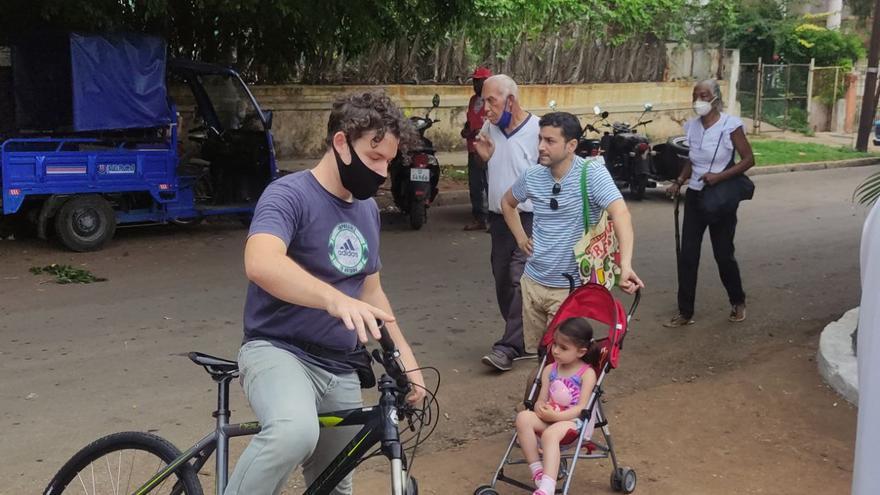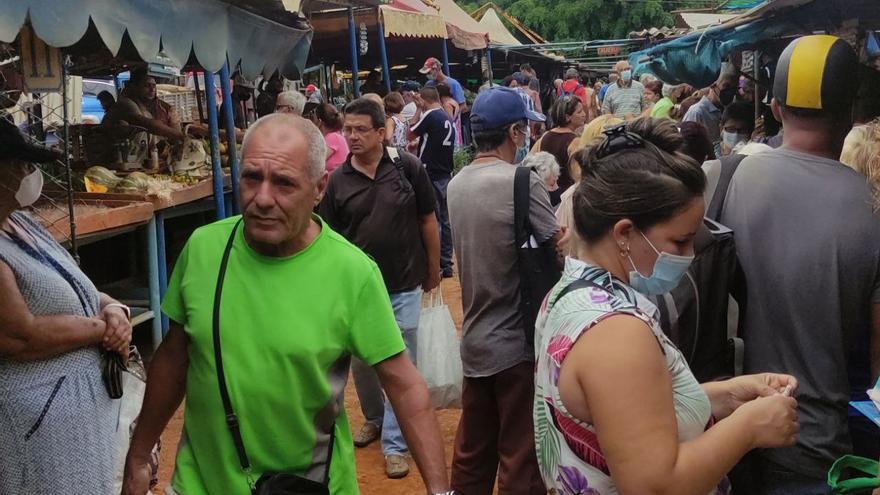
![]() 14ymedio, Juan Diego Rodríguez, Havana, 31 May 2022 — For the first time in 26 months, starting this Tuesday, Cubans can go out without a mask, but the reception of the elimination of its mandatory use was, at least first thing in the morning, very timid.
14ymedio, Juan Diego Rodríguez, Havana, 31 May 2022 — For the first time in 26 months, starting this Tuesday, Cubans can go out without a mask, but the reception of the elimination of its mandatory use was, at least first thing in the morning, very timid.
In the streets of Havana, it could be observed, that out of every ten people, roughly only one or two were not wearing a mask.
“I took it off because I wanted to feel what it’s like to breathe after so long with the air on my face,” said a young woman from Centro Habana, visibly happy not to be wearing one. “A curious thing is that people look at you as if they were looking for approval to take it off, and when they see you without it, then they take it off too.”
The youngest are, without a doubt, the most grateful for the end of this prohibition. There are not a few studies that have shown the ineffectiveness of masks to prevent infections in the child population and the learning difficulties that they have entailed.
Less happy were the elderly, among whom almost none were seen without a mask. “Look at that, what kind of danger, what irresponsibility!” shouted a man of about eighty years to a father who went hand in hand with his unmasked daughter.
Today, in any case, the fines for not wearing a mask are history. Previously they ranged between 2,000 and 3,000 pesos, according to the regulations in force since September 2020 (when the basic salary was still 400 pesos per month). The first weeks after the measure was implemented, the number of people sanctioned exceeded a thousand daily.
These punishments, however, once commercial flights were opened in the country, on November 15, 2021, were not applied to foreign tourists. In fact, the Police did not even call attention if they walked down the street without facemasks. In those days, it must be said, in much of the world the obligation to wear masks outside had been eliminated, after reaching large percentages of the population had been vaccinated with different antidotes, recognized by the World Health Organization (WHO).
In this sense, in Cuba, the elimination of the masks has been long in coming, despite the fact that the Government has presumed for months to have most of its population vaccinated with its own drugs, Soberana 02, Soberana Plus and Abdala, none of which, to date, have been approved by the World Health Organization (WHO).

The comings and goings on the manufacture of national azulitas [‘little blue things’] within the Island will also be history, something that, after being announced with great fanfare in 2021, only began to materialize just last April, when the pandemic was on its way out all over the planet.
The relaxation of the measures against the covid-19 pandemic, announced this Monday by the Minister of Public Health, José Ángel Portal Miranda, are a reaction, according to the official explanation, to the decrease in the transmission of the disease in May by 81 .1% compared to the month of April.
However, the Government has called for caution. “Finally without masks, but not always or in all situations. I recommend that you see the adaptation of our protocols for this stage. An informed people is a protected people,” President Miguel Díaz-Canel wrote on Twitter.
Health authorities insist that the use of masks is a “personal decision” and recommend wearing one in spaces where many people gather or if it is not possible to maintain physical distance. This is what happened this Tuesday in the markets of Havana, where, despite being outdoors, not many appeared without a mask.
Yes, its use will continue to be mandatory in medical consultations or in “areas with restricted focus controls,” according to Minister Portal Miranda. At the same time, the decision is maintained not to allow people “with respiratory symptoms” to enter workplaces and schools.
The measure will be in force depending on the behavior of the country’s epidemiological situation and its effectiveness will be evaluated “periodically,” and readjustments may even be made, the authorities warn.
This same Tuesday, the Public Health report shows only 29 positives for the coronavirus, 176 active and, again, no deaths, among the lowest statistics reported since November 2020.
In any case, the official figures have been questioned since the latest demographic data was made public this month by the National Office of Statistics and Information (Onei). According to a report dated May 11, in 2021 55,206 more Cubans died on the Island than in 2020, that is, a total of 167,645 people compared to the 112,439 who did so the previous year, an increase of 49.1%.
The figure contrasts abysmally with the deaths reported by covid-19 during 2021 by Public Health, 8,177, which indicates an underreporting in the official data of the pandemic on the Island of 47,029. That is, the underestimation was 85.2% (there were 6.75 times more deaths than those officially attributed to covid). Or put another way, during the pandemic the Cuban government has declared only a seventh of those who died of coronavirus.
____________
COLLABORATE WITH OUR WORK: The 14ymedio team is committed to practicing serious journalism that reflects Cuba’s reality in all its depth. Thank you for joining us on this long journey. We invite you to continue supporting us by becoming a member of 14ymedio now. Together we can continue transforming journalism in Cuba.
